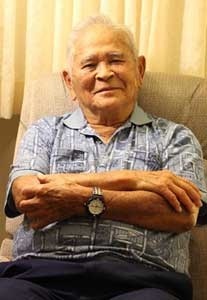Mac Yonamine spreads Okinawa love in Hawaii

Okinawan Nisei Mac Masayuki Yonamine
April 25, 2016 Ryukyu Shimpo
By Hanae Higa Gushiken
This January, Mac Masayuki Yonamine (Nishihara Chojin Kai of Hawaii United Okinawa Association) turned 88 years old. Last year, Yonamine made donations to the Hawaii Okinawa Center towards the installation of an elevator and for the construction of a resource center in the future. In 2013, Yonamine helped find a final resting place for Katsu Ishiki, an Okinawan Issei (first generation immigrant), whose unclaimed remains were stored in a vault for many years at the Oahu Cemetery. After conducting a Buddhist memorial service, Katsu was finally able to rest in peace. Yonamine’s selfless contributions to the Uchinanchu (Okinawan) community have caught the attention of local newspapers. We interviewed Yonamine to ask him what the Uchinanchu Community means to him.
― Please tell us about your family.
“I was born in Maui Island in 1928. My father is Taro Yonamine and my mother is Ushi Yonamine (maiden name: Takushi). They are both from Kouchi, Nishihara Town. I was their second child. In 1905, my grandfather, Jiro Yonamine migrated to Maui Island, followed by my grandmother, aunt, and father, who was 12 or 13 years old at the time they migrated in 1913. They worked on a pineapple farm. In 1918, my father married my mother Ushi who was around 17 or 18 years old and living in Okinawa at the time. They were blessed with five children.”
― What was your childhood like?
“My parents were very hard-working. When I didn’t have school, I had to do chores on the farm. Working on the farm was so rough that I even remember thinking to myself, ‘I’d rather die than continue working like this.’”
“My parents weren’t drinkers at all, but they knew how to make sake. My mother would make sake, using potatoes and sold them off for a dollar per gallon (around 3.8 liters). Considering that working on the farm made a dollar per day, this was very good business. Many Uchina (Okinawan) women would make and sell sake, trying to supplement the household income.”
“I remember my parents would often tell me in Uchinaaguchi, ‘we all want a lot of things, but there’s very little that we actually need.’”
― I heard your wife also has Okinawan roots as well?
“My wife Patsy is an Okinawan Nisei (second generation immigrant) and her maiden name was Arakaki. I couldn’t imagine marrying someone who wasn’t an Uchinanchu. She had to be an Uchinanchu, not even a Japanese American. That way she would be able to speak Uchinanchu with my parents who don’t speak English. We were both teachers. Although we were not blessed with any children, we had many relatives around, including our nieces and nephews.”
― Are you looking forward to the Worldwide Uchinanchu Festival this October?
“We visit Okinawa almost every year and always look forward to participating in the Worldwide Uchinanchu Festival. Twenty years ago, when we’d come back to Okinawa, you’d always hear people speaking in Uchinaguchi. But recently, we hear lots of Chinese and it’s become difficult to find someone who seems like an Uchinanchu. I feel a bit sad, but I’m sure it’s a sign that Okinawa is developing.”
― What does the Uchinanchu Community in Hawaii mean to you?
“The Hawaii United Okinawa Association began with Issei Okinawans. In order to keep passing the baton down to the fourth, fifth, and sixth generations, it is essential for each Sonjin Kai and Chojin Kai to work together in solidarity. We provide financial assistance to young Uchinanchu from Hawaii, visiting Okinawa for the first time. We want to keep encouraging them to visit Okinawa. “
(Translation by T&CT, Kaya Doi)
Previous Article:Film shows former village where Futenma Air Station now stands
Next Article:Okinawa tourist numbers break record, reaching about 8 million
[Similar Articles]
- Shiroma honors Okinawan parents through community service
- HUOA President couple busy for sister-state events
- Hawaii United Okinawa Association welcomes new president
- Hawaii-Okinawa photo exhibition at Hawaii Okinawa Centre
- Play about fourth-generation Okinawan in Hawaii released
 Webcam(Kokusai Street)
Webcam(Kokusai Street)


